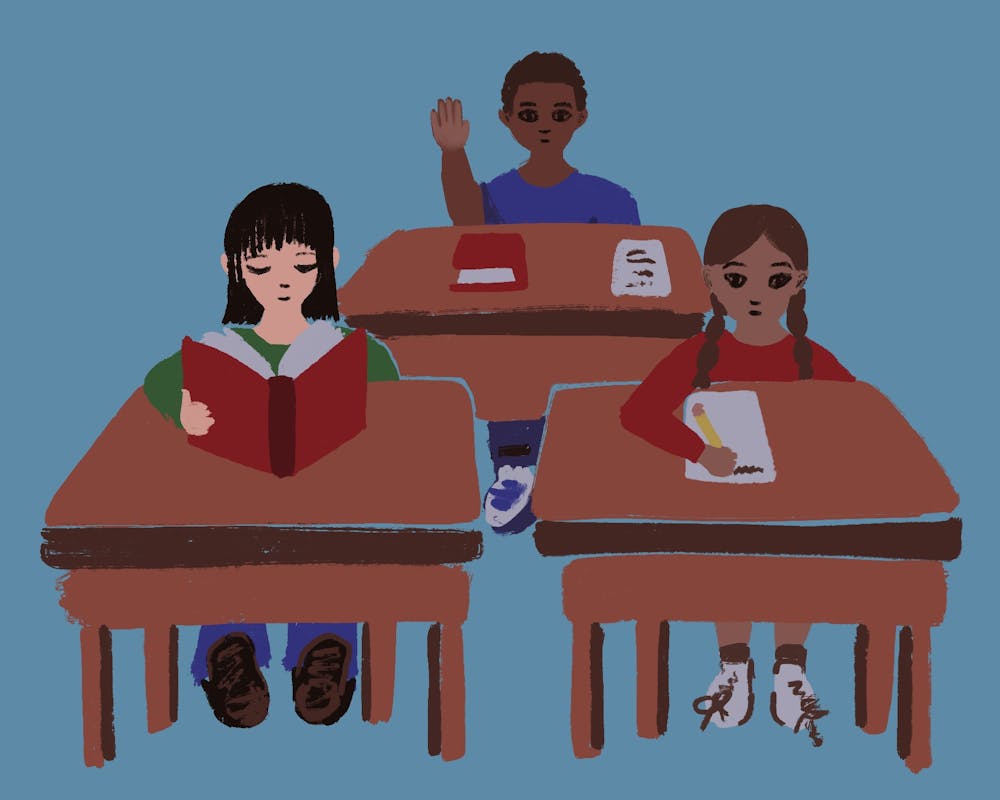State lawmakers in the House Education Committee convened for a public hearing April 11 on H7539, a bill that seeks to restrict teaching about race, sexuality and gender identity in Rhode Island public schools. Hundreds of Rhode Islanders submitted written testimony to the committee, and many also came to the Rhode Island State House to voice their opinions on the legislation.
The bill, originally introduced Feb. 18, proposes new guidelines for curricula that address topics of race and sexuality. The bill would prohibit educators from teaching history that presents members of any race as a victim or oppressor and would forbid the use of “pejorative” terms such as “supremacy,” “racial guilt” and “racial fragility,” according to the text of the bill. Additionally, the bill stipulates that “sex education shall not explore sexual preference, gender dysphoria or sexual lifestyles.” The bill states that by teaching these subjects, students are not “judged and accepted by the content of their character” but instead by “their race, ethnicity, gender or religion.”
Rep. Patricia Morgan, a Republican from Warwick who authored the bill, told The Herald that the bill aims to protect the civil rights of children in schools. Children “are not being judged as individuals” when subjects such as race, sexuality and gender identity are taught in schools, Morgan said. “They are being stereotyped and judged as members of an identity group, … and I think that is antithetical to the Civil Rights Act,” she added.
Morgan said she has received “at least 100 phone calls” from parents who are concerned about what is being taught to their children in schools and who believe their children’s civil rights are being violated in the classroom.
Rep. Edith Ajello, a Democrat who represents College Hill in the House, opposes the bill. “It’s divisive (and) it’s mean-spirited,” she told The Herald. “And it’s doing nothing to make the education of the children in our schools better (and nothing) to help them live in this world and thrive in this world.”
Some at the hearing earlier this month said the portion of the bill addressing sexuality and gender identity education resembles other bills being passed in state legislatures across the country in recent months, including a bill passed in Florida in March that critics dubbed the “Don’t Say Gay” bill, which garnered national attention.
But according to Morgan, H7539 has nothing to do with legislation appearing in other states. Instead, the bill is about “allowing the right people to help those children” who identify as LGBTQ+, she said.
John Palella, lecturer in education and a researcher on the teaching of LGBTQ+ history in classrooms and racial history, told The Herald that it is important for children to learn about gender and sexuality at a younger age. “As all the research shows, it’s actually super healthy for children to learn about different gender identities, identities different from themselves … and (to understand) the inclusivity and diversity of those identities,” he said.
Teaching children about these identities can also provide them with the tools to identify their own experiences, according to Daisy Bassen, a child psychiatrist based in Warwick. “I think when children understand and have language to describe what they are experiencing, they are able to feel good about themselves … and participate in the world in a positive way,” she told The Herald.
But Morgan alleged that classrooms are not the proper environments for these discussions. “Teachers are not therapists, they are not psychologists, they are not mental health professionals,” she said. “They don’t have the expertise to deal with these issues.”
Instead, Morgan believes that conversations about gender identity and sexuality should remain between children and their parents. “Nobody cares about you more than your mother and father,” she argued.
“I used to be a teacher, and I cared about my (students),” Morgan said. “But the truth is, I was (just) a tourist in their lives.” Morgan said parents are a much more constant presence in children’s lives and conversations about gender and sexuality with parents should happen, even though they can be difficult.
But Bassen noted that this may not be the case for all children. “Obviously we hope that every child has a family system where they can feel nurtured and appreciated and loved,” she said. “But that’s not true for every child (and sometimes) they need to find that affirmation and that recognition in a school teacher, in a guidance counselor, in a coach,” she added.
Ajello agreed that children need to be able to rely on their teachers for support. “Most of us, as parents and human beings, can’t probably imagine all of the different challenges that some students bring to school and deal with in their own lives,” Ajello said. “We need to allow teachers the freedom to (help) deal with that in ways that are supportive.”
Morgan said that parents should send their children to see a mental health professional if they are struggling with their gender identity or sexuality, but she opposes having these mental health professionals in schools.
According to Bassen, access to mental health support in schools is beneficial to students. Schools are focused on the social-emotional development of their students, Bassen said, and she does not “understand how you can work on social-emotional development and not have school psychologists or social workers” available to students. She added that when mental health professionals are in schools, students can more easily and immediately access mental health resources.
Palella emphasized that students should receive support and acceptance in schools. “It’s not up to the school to police children’s identities,” he said. “It’s (up to the school) to create a home space for them to explore and be supported.”
“Schools that have open dialogues about gender and sexuality are the schools where students who are trans or gender non-conforming or LGBTQ+ are the healthiest and the happiest, when they have these spaces to talk about their identities,” Palella added.
As for the future of the bill, Morgan said that she will be refining the language with lawyers to clarify any ambiguities. But the main purpose of the bill will not change, she said.
The bill aims “to protect our children,” Morgan said, “to make sure that their civil rights are protected in all cases and to refocus educators (and) our schools on their primary purpose, which is to prepare children for successful adult life by teaching them academics,” she added.
Ajello believes that support for the bill is not widespread. And in a state legislature with a strong Democratic majority, the chances that the bill passes remain slim, she added.
“I understand that legislation like this is concerning,” Ajello said. “That the topic is (being) brought up and considered in Rhode Island at the State House is … deeply concerning. But I do not think that there is anywhere near a majority of opinion among my colleagues that would support passing anything like this.”
Although the bill “will probably die” in committee, she said, proponents of the bill “may come back with a big game” in the next legislative session.

Sam Levine is a University News editor from Brooklyn, New York covering on-campus activism. He is a senior concentrating in International and Public Affairs.





